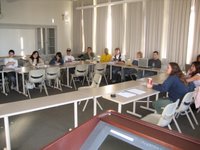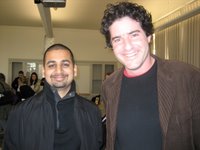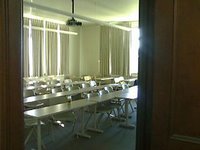 digital democracy meets in a classroom on the third floor of lone mountain. throughout the semester, we have experimented with the best way to configure the room. i'm starting to think that this shape, a u-shape, is the best for class discussions. in this configuration, all of the students are able to see and hear the speaker and see and hear each other.
digital democracy meets in a classroom on the third floor of lone mountain. throughout the semester, we have experimented with the best way to configure the room. i'm starting to think that this shape, a u-shape, is the best for class discussions. in this configuration, all of the students are able to see and hear the speaker and see and hear each other.a few days ago, veanne, a student in digital democracy, introduced me to anil dash and he agreed to be yesterday's guest lecturer. anil is vp of six apart, the folks behind typepad, moveable type, livejournal, and now vox. anil has been blogging since 1999.
if this whole blogging thing doesn't work out, anil should consider becoming a teacher. he gave an hour lecture and then took Q and A's for another 45 minutes. he had all of our attention.

anil described his passion as helping people make media, and later described his job as "building tools so people can make media." he began his talk by taking us back to 1999, the year he began observing what we now call the read/write web or web 2.0. he described the company he works for, shared what it felt like when they went from 3 to 145 employees, and noted that there are 15 million people using the tools they developed.
anil had a ton to say about online community - although i don't recall him using that term. he said: know your readers; know what your goal is; and understand what your space is. anil shared his findings that suggested when a community - community here being a readership around a blog, a group of people on craig's list, or a community of writers/editors on wikipedia - becomes too large, it becomes unruly - at one point he said, "people are bad in mobs." he gave numbers when trolls can be expected and he gave numbers when nasty or simply unproductive blog comments come into play. knowing a good number, anil seemed to suggest, is related to knowing what your goal is. if your goal with a blog is to become big and famous, go for it - and good luck. but if your goal is to, say, keep in touch with family members, maintain friendships online, or share ideas on a specific, shared interest, then a smaller readership is most desired. finally, to explain the last point - understand what your space is - he referred to the classroom and said that within the class we had a common goal: to learn. understanding what the goal is and how to configure an online space (or offline, as in the case of the u-shaped desks) to make that goal thrive is key. he ended this point by mentioning the dunbar number and, like a good professor, told us all to go home and learn more about what that means.
he talked about blogging in iran. he talked about what it means to develop tools that store things most precious to people - like their baby pictures (anil: "there's things you just don't want to disappear"). and he talked about vox and the next step of blogging - a kind of blogging that brings together our multiple online identities and communities. (last night, while talking with sarah, i noted that if microsoft's passport attempts to bring together our multiple consumer identities, an application like vox tries to bring together our multiple creative identities.)
he also scared the bejeezus out of many of my students by saying something that i've been trying to say for years: that when employers like six apart receive applications the first thing they do is google / facebook / technorati them. (at this point, the collective anxiety of my students, perhaps recalling some of the pictures they uploaded to facebook, raised to the roof.) he explained that our private identities are as public as they get, but he also said that this can be an opportunity: he encouraged the students to be aware of their online identity and to make sure it reflects their full selves. (for the record, this is an issue i am working on with multiple colleagues and students as part of USF's campus-wide digital literacy task force - more on that someday soon.)

there was so much more that happened within the hour and forty five minutes. one of the best parts was when we opened up the session for questions. there was a particularly fascinating exchange, prompted mostly by hilary's excellent questions, about whether we are becoming too mediated - whether there might be something very unhealthy about the mediated spaces are lives increasingly occupy. there were questions about the future and questions about the past. and there were questions about digital democracies and digital divides.
anil said two things that i hope, hope, hope my students heard. first, he said that the best job is one you feel passionate about, one you actually enjoy doing. second, he said that computer scientists are not the only kind of person firms like six apart are hiring - they need media scholars, media makers, anthropologists, people who study human behavior.
all in all, an excellent class - a perfect class to get the students' and my mind racing as we head into the last week before finals.
update: a quick pic of what the class normally looks like, sans the u-shape configuration:


4 comments:
anil is one of the bright stars out there, were he on the east coast, I'd have invited him myself.
I *really* appreciated the chance to come talk to the class, and learned a lot from both you and the students. I am also glad we got a chance to chat a bit afterwards, so thanks again for the opportunity. And Jeremy, I'll be based on the east coast soon, and travel a lot -- feel free to get in touch!
Great write up! Cool that you've gotten connected with Anil so quickly since moving to SF--having access to those kinds of connections is a great perk of being in the Bay Area.
This was a great post! Appreciate the effort. Find the best strategies in the profile of Core Ball. If you are looking for a game that is both simple and fun, Coreball is a great choice. It is easy to learn and enjoyable to play.
Post a Comment